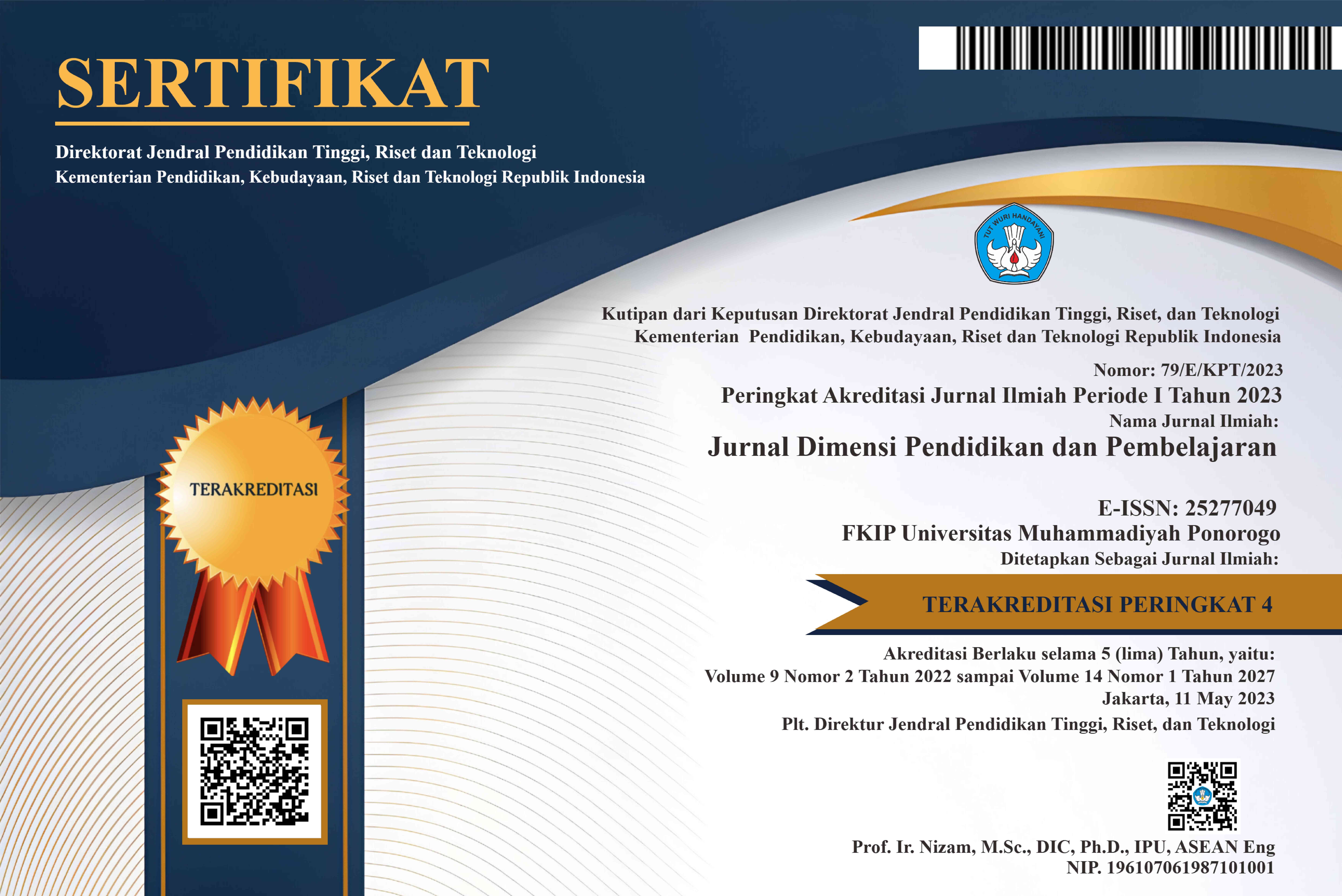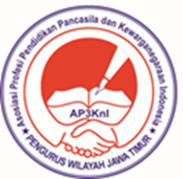Hubungan Pembelajaran Online Terhadap Stres Akademik Mahasiswa STKIP Muhammadiyah Barru Dimasa Pandemi Covid-19
DOI:
https://doi.org/10.24269/dpp.v10i2.3901Abstract
Abstrak
Masa pandemi covid-19 terjadi hamper diseluruh dunia yang menyebabkan kegiatan banyak orang harus kita hindari, serta jaga jarak dan pake masker, dimana kegiatan salah satunya adalah proses belajar mengajar. Pemerintah Indonesia telah mengeluarkan kebijakan semua kegiatan atau proses belajar mengajar harus di lakukan di rumah dengan sistem daring/online di perguruan tinggi. Upaya ini dilakukan dalam rangka pencegahan penyebaran Covid-19. Tujuan penelitian ini untuk mengetahui hubungan pembelajaran online terhadap stres akademik mahasiswa STKIP Muhammadiyah Barru selama masa pendemi covid-19. Adapun jenis penelitian ini adalah observasional analitik dengan pendekatan cross sectional. Penelitian ini di lakukan pada bulan Oktober 2020 dengan responden mahasiswa strata satu di kampus STKIP Muhammadiyah Barru dengan jumlah 250 responden. Pengambilan data dengan menggunakan kuesioner yang disebarkan dalam bentuk Google Form tentang informasi pembelajaran online dan stress akademik. Analisis yang digunakan dalam penelitian ini uji analisis regresi logistik. Hasil penelitian ini memperlihatkan bahwa pembelajaran online mempunyai hubungan stress akademik selama masa pandemi covid-19. Pembelajaran online perlu di dukung dengan sarana dan prasarana, kesiapan juga keterampilan dosen sehingga stress akademik pada mahasiswa dapat dihindari.
Â
Abstract
The Covid-19 pandemic occurred in almost all parts of the world, which caused the activities of many people to be avoided, as well as maintaining distance and wearing masks, one of which was the teaching and learning process. The Indonesian government has issued a policy that all teaching and learning activities or processes must be carried out at home with an online system in universities. This effort was carried out in order to prevent the spread of Covid-19. The purpose of this study was to determine the relationship between online learning and academic stress of STKIP Muhammadiyah Barru students during the Covid-19 epidemic. The type of this research is analytic observational with cross sectional approach. This research was conducted in October 2020 with 250 respondents from undergraduate students at the STKIP Muhammadiyah Barru campus. Retrieval of data using a questionnaire distributed in the form of Google Form about online learning information and academic stress. The analysis used in this study was a logistic regression analysis test. The results of this study indicate that online learning has a relationship with academic stress during the Covid-19 pandemic. Online learning needs to be supported by facilities and infrastructure, readiness and skills of lecturers so that academic stress on students can be avoided.© 2019 Universitas Muhammadiyah Ponorogo
References
Atziza, R. (2015). Faktor-Faktor yang Mempengaruhi Kejadian Stres dalam Pendidikan Kedokteran. Jurnal Agromedicine, 2(3), 317–320.
Barokah. (2019). Kominfo: 83% Pengguna Internet adalah Pengguna Whatsapp. Kementerian Komunikasi Dan Informatika.
Barseli, M., & Ifdil, I. (2017). Konsep Stres Akademik Siswa. Journal Konseling dan Pendidikan,5,143 https://doi. org/10.29210/119800
Cao, W., Fang, Z., Hou, G., Han, M., Xu, X., Dong, J., & Zheng, J. (2020). The psychological impact of the COVID-19 epidemic on college students in China. Psychiatry Research, 287,112934. https:// doi.org/10.1016/j.psychres.2020.112934
Dabbagh, N. (2007). The Online Learner: Characteristics and Pedagogical Implications. Contemporary Issues in Technology and Teacher Education, 7(3),217–226.
Daheri, M., Juliana, J., Deriwanto, D., & Amda, A. D. (2020). Efektifitas WhatsApp sebagai Media Belajar Daring. Jurnal Basicedu, 4(4), 775–783. https://doi.org/10.31004/basicedu.v4i4.445.
Firman, F., & Rahayu, S. (2020). Pembelajaran Online di Tengah Pandemi Covid-19. Indonesian Journal of Educational Science (IJES), 2(2), 81–89. https://doi.org/10.31605/ijes.v2i2.659
Fitriah, M. (2020). Transformasi Media Pembelajaran pada Masa Pandemi Covid- 19.Liputan6.Com.https://www.liputan6.com/citizen6/read/4248063/opini- transformasi- media- pembelajaran- pada-masa-pandemi-covid-19
Gadzella, B. M., & Masten, W. G. (2005). An Analysis Of The Categories In The Student-Life Stress Inventory. American Journal of Psychological Research, 1(1), 1–10.
Gikas, J., & Grant, M. M. (2013). Mobile computing devices in higher education: Student perspectives on learning with cellphones, smartphones & social media. The Internet and Higher Education,19,18–26. https://doi.org/10.1016/j. iheduc.2013.06.002
Gugus Covid-19. (2020). Gugus Tugas Covid-19.
Gunadha, R., & Rahmayunita, H. (2020). Kuliah Online saat Corona Picu Ketimpangan Akses Bagi Mahasiswa Miskin. https://www.suara.com/news/2020/0 4/16/130712/kuliah-online- saat- corona-picu-ketimpangan- akses-bagi- mahasiswa-miskin.
Hamdani, A. R., & Priatna, A. (2020). Efektifitas Implementasi Pembe- Lajaran Daring (Full Online) Dimasa Pandemi Covid- 19 Pada Jenjang Sekolah Di Kabupaten Subang. Didaktik : Jurnal Ilmiah PGSD STKIP Subang, 6(1),1–9. https://doi.org/10.36989/didaktik. v6i1.120
Kai-Wen, C. (2010). A study of stress sources among college students in Taiwan. J Acad Business Ethics, 2.Kompas. (2020). Hambatan dan Solusi Belajar dari Rumah. https://muda.kompas.id/baca/2020/0 4/10/hambatan-dan-solusi- saat- belajar-daring-dari- rumah/
Korucu, A. T., & Alkan, A. (2011). Differences between m-learning (mobile learning) and e- learning, basic terminology and usage of m- learning in education. Procedia - S ocial and Behavioral Sciences, 15,1925–1930. https://doi.org/10.1016/j. sbspro.2011.04.029.
Kumar & Nanda. 2019. Social media in higher education: A Framework for continuous engagement. Internasional journal of information and communication technology education (IJICTE), 15 (1).www,igi- global.com/article/social-media-in- higher- education/217471
Kupriyanov, R. (2014). The Eustress Concept: Problems and Outlooks. World Journal of Medical Sciences, 11,179– 185. https://doi.org/10.5829/idosi. wjms.2014.11.2.8433
Marmi. (2014). Kesehatan Reproduksi. Pustaka Pelajar.
Moore, J. L., Dickson-Deane, C., & Galyen, K. (2011). e-Learning, online learning, and distance learning environments: Are they the same? The Internet and Higher, 14(2),129–135.https://doi. org/10.1016/j.iheduc.2010.10.001
Nizam. (2020). Optimalisasi Pembelajaran Daring untuk merdeka belajar. In Webinar.
Nurmaliyah, F. (2014). Menurunkan Stres Akademik Siswa dengan Menggunakan Teknik Self- Instruction. Jurnal Pendidikan Humaniora, 2(3), 10.Ph, L., Mubin, M. F., & Basthomi, Y. (2020). “Learning Task†Attributable to Students’ Stress During the Pandemic Covid-19. Jurnal Ilmu Keperawatan Jiwa, 3(2),203–208. https://doi.org/10.32584/jikj. v3i2.590
Rudi, Hidayat & Ida Rosiana. (2020). Pengaruh Sistem Pembelajaran Daring Terhadap Motivasi dan Kualitas Belajar Siswa. https://ejournal,undiksha.ac.id. Volume 11, no 2, 2020: JJBK UNDIKSHA.
Sarita, & Sonia. (2015). Academic Stress among Students: Role and Responsibili- ties of Parents. International Journal of Applied Research, 1(10), 385–388.Stein, R. A. (2020). COVIDâ€19 and rationallylayered social distancing.International of Clinical Practice .https://doi. org/10.1111/ijcp.13501
Stein, R. A. (2020). COVIDâ€19 and rationallylayered social distancing. International Journal of Clinical Practice.https://doi. org/10.1111/ijcp.13501
Taylor, (2003). Health Psychology. McGraw- Hill.Inc. Wang, C., & Zhao, H. (2020). The Impact of COVID-19 on Anxiety in Chinese University Students. Frontiers in Psychology, 11. https://doi.org/10.3389/ fpsyg.2020.01168
Watnaya, dkk. (2020). Pengaruh Teknologi Pembelajaran Kuliah Online di Era Covid- 19 dan Dampak terhadap Mental Mahasiswa. EduTeach : Jurnal Edukasi Dan Teknologi Pembelajaran, 1(2), 153–165. https://doi.org/10.37859/eduteach. v1i2.1987
WHO. (2020). Coronavirus disease (COVID- 19) pandemic.
Widiyono, A. (2020). Efektifitas Perkuliahan Daring (Online) pada Mahasiswa PGSD di Saat Pandemi Covid 19. Jurnal Pendidikan, 8(2), 169–177.https://doi. org/10.36232/pendidikan.v8i2.458
Downloads
Published
Issue
Section
License
Copyright
Authors who publish their manuscripts in this journal agree to the following terms:
- The copyright on each article belongs to the author.
- The author acknowledges that Jurnal Dimensi Pendidikan dan Pembelajaran has the right to be the first to publish under a Creative Commons Attribution 4.0 International (Attribution 4.0 International CC BY 4.0) license.
- Authors may submit articles separately, arranging for the non-exclusive distribution of manuscripts that have been published in this journal to other versions (e.g., sent to the author's institutional repository, publication into books, etc.), acknowledging that the manuscript was first published in the Jurnal Dimensi Pendidikan dan Pembelajaran.
Â
License
Use of the article will be governed by the Creative Commons Attribution license as currently published under the Creative Commons Attribution 4.0 International License (Attribution 4.0 International (CC BY 4.0).
Â
This license permits anyone to copy and redistribute this material in any form or format, compose, modify, and make derivatives of this material for any purpose, including commercial purposes, as long as they give credit to the author for the original work.



_001.jpg)



